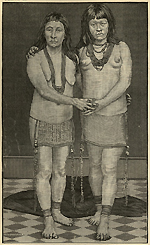The World That Darwin Made

Esequibo Indian women, in Edward D. Cope, Origin of the fittest, 1887
Darwin’s ideas circulated widely. They were quickly taken up by a variety of scientific, cultural, and political projects. Colonialism, racism, capitalism, socialism, atheism, materialism, sexism, feminism, modernism, and, of course, the life sciences, all claimed the Darwinian mantle. What united them was the insight that the human species was just another biological organism, fully subject to the natural order of things. A strong corollary was that we retain the primitive attributes of our ancestors: we all have a beast within; our humanity is a thin veneer. And indeed, Darwinism brought to the fore emerging ideas in Western intellectual life, ideas that claimed no order beyond the natural order—that provided no privileged place for theology or metaphysics—that saw our place in the world coming solely from the world itself.
Social Science
Darwinism became a touchstone for the emerging social sciences of the late nineteenth century. Social critics such as Herbert Spencer (1820-1903) argued that “survival of the fittest” (his phrase) justified laissez-faire capitalism, where all competed against all in the “struggle for existence” (Darwin’s phrase). Spencer portrayed the human social world as the sphere of unrestrained competition, with all attempts to mitigate that struggle as hindering the evolutionary process, being out of synch with nature.
Karl Marx (1818-1883) and his collaborator, Friedrich Engels (1820-1895), also claimed Darwin, but for scientific socialism. They laid out a pattern of social evolution—from primitive societies, through ancient empires, feudalism, and capitalism, to socialism—whose engine of change lay in the internal dynamics of the society, as it grappled with the human problems of getting and sharing the wealth of the world. Marx maintained that—just as Darwin had done—he was describing the inevitable changes in the evolving social and economic world, which he observed and understood as a scientist would.
Last Reviewed: May 7, 2014


